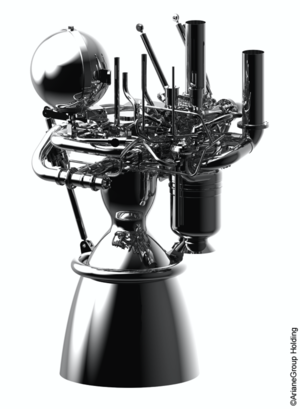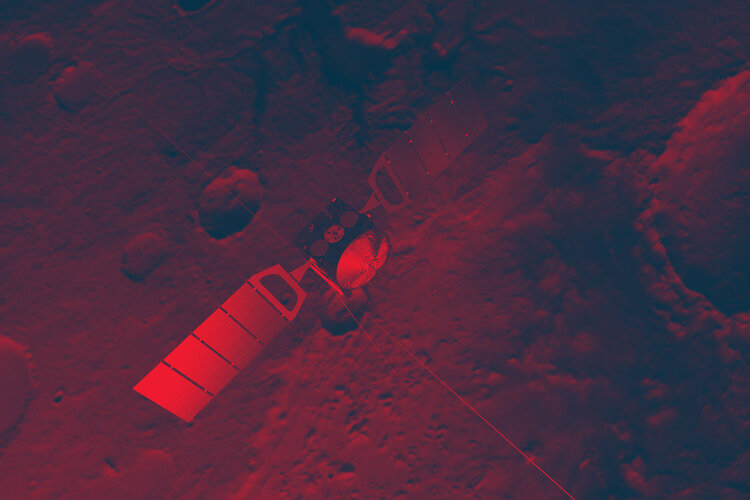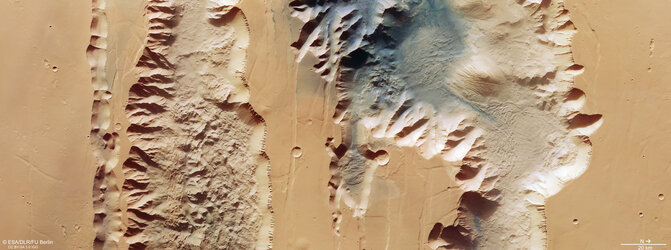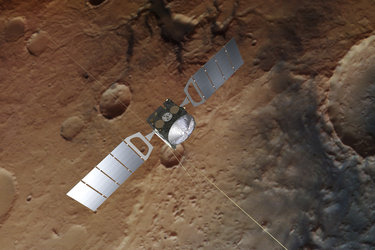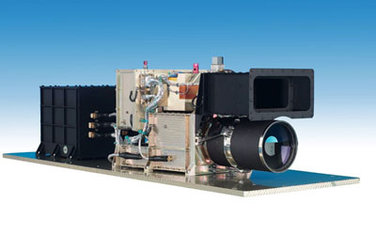Investigating Mars's Mysteries: An interview with Olivier Witasse
Olivier Witasse became Project Scientist of Mars Express in June 2009, taking over from Agustin Chicarro who held this position from 1997.
As Project Scientist, Olivier Witasse takes care of all the scientific aspects of the mission. For example, monitoring the scientific outcome, checking that the observations needed to achieve the extended mission objectives are planned, monitoring the growth of the data archive, and organising dedicated scientific workshops and international conferences. In addition, Olivier contributes to outreach and media activities related to the mission. As scientist, he carries out some research activities, particularly on the upper atmosphere of the red planet.

Olivier Witasse
Project Scientist, Mars Express
Born: 5 May 1972, in Paris, France.
Olivier studied fundamental physics and astrophysics at the universities of Paris XI (Orsay) and Lyon between 1990 and 1996. He obtained a PhD at the University of Grenoble in 2000, under the supervision of Dr Jean Lilensten, in ‘Modelling of the ionospheres and airglow of the Earth and Mars’.
In 1995, he successfully completed the exams to become a teacher of Physics and Chemistry. He taught physics during his military service, and during his PhD at the university.
He joined ESA as a staff member in 2003, after a two-year research fellowship at ESTEC and a four-month post doc at the Royal Observatory of Belgium.
Olivier lives in the Netherlands and enjoys reading, watching old movies, and cycling.
ESA: What did you do at ESA before becoming Mars Express Project Scientist?
Olivier Witasse
I joined the Agency in 2003 as Deputy Project Scientist on Huygens, a very interesting mission. Once the data was formally released in the archive, I moved to Venus Express as Deputy Project Scientist and also Chandrayaan-1 as ESA Project Scientist. I became Mars Express Deputy Project Scientist in mid-2007, so the transition to Project Scientist in 2009 was very smooth.
Even in routine operations, there is always something happening
ESA: How do you feel about taking care of a well-established mission?
Olivier Witasse
Even in routine operations, there is always something happening: requesting a mission extension, deciding an orbit change, preparing for close flybys of the Phobos moon, organising workshops and conferences, and seeing new results coming in every month. It is exciting to interact with so many partners: the scientific community, the different services of ESA, the media, and also with the general public.
ESA: What fascinates you most about Mars?
Olivier Witasse
I am interested in everything about Mars but particularly in three questions. First, why is there methane in the atmosphere of Mars? One hypothesis is micro-organisms, but even if it is from geological processes, it means Mars is still active. Second, how did the two little Martian moons form? They look like asteroids but cannot have been captured. And finally, was there ever life on Mars in the planet’s early history? The OMEGA instrument on Mars Express has shown the presence of water in the past, so could life have evolved there?
I had lecturers who gave me the astronomy and planetary sciences bug
ESA: How did you first become interested in space science?
Olivier Witasse
When I went to university, I read a book by Hubert Reeves called Patience dans l'azur, and that was really the start. It was very well written, covered all the sciences and had a little bit of poetry included. Then, I had lecturers who gave me the astronomy and planetary sciences bug. By chance, one of them now works on Mars Express.
ESA: What advice would you give to somebody who would like to work in space research?
Olivier Witasse
Keep your motivation. It is difficult to get a position but it is a wonderful job. It takes eight years of study and then perhaps four or five years of post-doctoral research.















 Germany
Germany
 Austria
Austria
 Belgium
Belgium
 Denmark
Denmark
 Spain
Spain
 Estonia
Estonia
 Finland
Finland
 France
France
 Greece
Greece
 Hungary
Hungary
 Ireland
Ireland
 Italy
Italy
 Luxembourg
Luxembourg
 Norway
Norway
 The Netherlands
The Netherlands
 Poland
Poland
 Portugal
Portugal
 Czechia
Czechia
 Romania
Romania
 United Kingdom
United Kingdom
 Slovenia
Slovenia
 Sweden
Sweden
 Switzerland
Switzerland






















